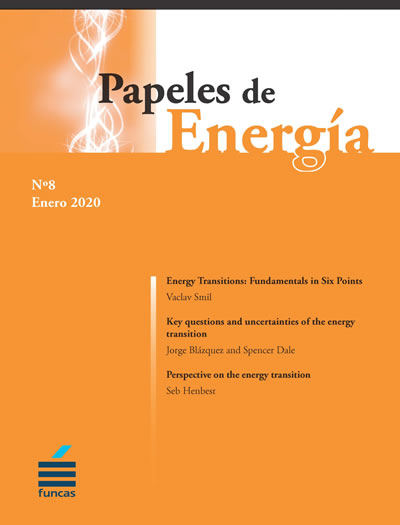Papeles de Energía
Fecha: 2020
Papeles de Energía, N.º 8 (enero 2020)
Sumario
[expand title= "Energy Transitions: Fundamentals in Six Points"]- The public discourse of the unfolding energy transition has been poorly defined, it has been often misinformed and misleading, almost always ahistorical, and overwhelmingly unrealistic. In this paper I focus on six fundamental realities that must be taken into account: There is nothing new about energy transitions; All energy transitions have many specific attributes, but the one currently underway is truly unprecedented; Decarbonization of the global energy supply is taking place not because of resource shortages and excessive prices, or because of the need to do away with inferior efficiencies and to increase supply reliability; Even moderate reductions of annual global carbon combustion are difficult because our dependence on fossil fuels is enormous and because most of the humanity needs more energy and this requirement cannot be met by a rapid expansion of renewables; Global civilization remains highly dependent on fossil fuels and future demand for coal and hydrocarbons will rise in many middle- and low-income countries; And decarbonization includes energy transitions that are relatively easy to accomplish as well as carbon substitutions for which we currently do not have any commercial non-carbon alternatives. As unique and as unprecedented the unfolding global energy transition may be, it shares the key feature with its predecessors: it will be a gradual, multidecadal, inter-generation process with different and diverging national pathways and rates of progress. Still, our commitment to innovation and to better ways of managing our energy use can make a real difference to its rate of progress.
- Leer más
- The energy system is changing. There is a well-known transition towards a lower carbon system, led by the rapid deployment of solar and wind energy. But that is only one dimension. The pattern of energy demand is also in transition, driven by growing prosperity in the developing world. In this context, this article explores the following five key issues that could shape the energy transition in the next two decades: first, how much more energy does the world need?; second, what might happen if the trade wars escalate?; third, how important are plastics for the future of oil demand?; fourth, how quickly could renewable energy grow?; and fifth, what more needs to be done to ensure a rapid transition to a lower-carbon energy system? The key message from this article is that the world is facing a dual challenge: it needs more energy to support continued growth and prosperity in developing world, whilst reducing carbon emissions. This is the key challenge facing all of us.
- Leer más
- Primary energy masks the important role of electricity and the growth and future potential of renewable energy. The “Phase I” decarbonization technologies of wind, solar PV, electric vehicles and stationary lithium-ion batteries are all on track for another record year of deployment in 2019, as technology cost continue to fall with every unit deployed. Today wind or PV is the cheapest new-build electricity for two-thirds of the world population and will soon undercut commissioned coal and gas plants. Cheaper batteries help renewables reach higher value hours when the wind isn’t blowing or sun isn’t shining. Battery costs are down 87% since 2010 as auto manufacturers push more models into the market. Uptake should accelerate from 2023 when EVs start to hit upfront price parity with ICE alternatives causing oil demand from road fuels to peak around 2030. Cheap variable renewables form the backbone of the new electricity system reaching as higher as 80% in some markets when supported by smart EV changing, batteries and peaker plants. Coal-fired electricity peaks in 2026 undercut by cheaper renewable and batteries as well as more flexible gas. Achieving net-zero emissions however ask serious questions about energy transition pathways for industry and buildings. And while going electric isn’t a universal solution and renewables are not a one-size-fits-all solution, deploying the “Phase I” technologies to their full potential can make a big dent in emissions and buy time for development of “Phase II”.
- Leer más

